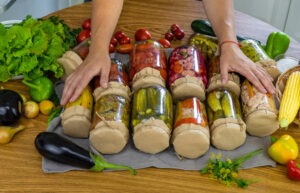 When it comes to the health of your gut, your diet plays a leading role, impacting the trillions of bacteria found throughout the digestive tract. While a poor diet can contribute to gut inflammation and discomfort, a nutritious diet can nurture your gut microbiome and enhance your overall health.
When it comes to the health of your gut, your diet plays a leading role, impacting the trillions of bacteria found throughout the digestive tract. While a poor diet can contribute to gut inflammation and discomfort, a nutritious diet can nurture your gut microbiome and enhance your overall health.
Fermented foods are a staple of any gut-friendly diet. They contain good bacteria, known as probiotics, or prebiotics, which feed the gut microbiome. 15 of the best-fermented foods for gut health include:
1. Kombucha
Kombucha is a fermented beverage made from tea, sugar, and SCOBY (symbiotic culture of bacteria and yeast). As the drink ferments, it becomes carbonated and tangy, with natural probiotics that benefit your gut. Be sure to choose one with a low sugar content, as some brands can be very high in sugar.
2. Kefir
Kefir is a fermented drink made from milk and kefir grains. Kefir grains contain billions of microorganisms that give this drink probiotic benefits.
3. Coconut Kefir
Do you have a milk sensitivity? If so, coconut kefir is a great alternative to traditional kefir. It’s made with coconut milk and kefir grains, providing the same probiotic benefits without the dairy.
4. Yogurt
Yogurt is milk that’s been fermented with a bacterial culture. Some yogurts contain several bacterial strains, providing well-rounded support for your gut. If you’re sensitive to cow’s milk, consider sheep or goat milk yogurt.
5. Cottage Cheese
Cottage cheese consists of milk curdles and cream. When purchasing cottage cheese, check the label to ensure it contains active cultures, which provide probiotic benefits.
6. Raw or Aged Cheese
Raw cheese is made with unpasteurized milk, while aged cheese is cured for extended periods. Both of these cheese varieties contain probiotics that can benefit your gut. Check the label to ensure that the cheese isn’t pasteurized and has been aged for at least six months.
7. Kimchi
Kimchi is a traditional side dish in Korean cuisine, containing salted, fermented cabbage or other vegetables. Kimchi is made through lacto-fermentation, leading to high amounts of natural probiotics. It’s also high in fiber, which can further support healthy digestion.
8. Fermented Pickles
This pantry staple can be a probiotic powerhouse, if it’s made properly. Most grocery store pickles are made with cucumbers and vinegar, which doesn’t cause fermentation. Instead, look for pickles made with cucumbers and brine, AKA salt and water. The jar will likely be labeled as “lactic acid fermented”.
9. Sauerkraut
Sauerkraut consists of cabbage and salt that have undergone lacto-fermentation, similar to kimchi. With a long, storied history dating back more than 2,000 years, sauerkraut is a longstanding source of dietary probiotics.
10. Miso
Miso is a fermented Japanese soybean paste. It’s made from soybeans and koji, a bean or grain that contains a fermentation culture. The fermentation process gives miso natural probiotics that help balance the gut microbiome.
11. Natto
Natto is made of fermented soybeans, and it’s often served with breakfast in Japanese cuisine. It’s rich in probiotics that improve digestion and overall gut health.
12. Raw Apple Cider Vinegar
Raw apple cider vinegar naturally contains probiotics, acetic acid, and antioxidants. Acetic acid, or ACV, can help kill harmful bacteria in the gut.
13. Sourdough Bread
Sourdough bread is fermented, containing lactic acid bacteria and wild yeasts. While probiotics don’t survive the baking process, sourdough bread still contains prebiotics that benefit the gut microbiome.
14. Kvass
Kvass is a fermented drink made from bread that’s soaked in water and fermented with yeast. It’s a traditional Russian beverage that’s rich in probiotics and contains small amounts of alcohol.
15. Tempeh
Tempeh is a fermented soybean paste with roots in Indonesia and Malaysia. It’s fermented with bacteria, yeast, and fungi, which make it a natural source of probiotics.
The team at Body Flow Wellness is here to optimize your gut health. Contact us today to learn more!
